Books by Fabio Wolkenstein
Hans Kelsen was one of the most important legal thinkers of the twentieth century. His contributi... more Hans Kelsen was one of the most important legal thinkers of the twentieth century. His contributions to constitutional theory, the doctrine of legal positivism and international law have influenced generations of scholars and practitioners of law, and they continue to be a major reference point in contemporary legal-theoretical debates. Kelsen also complemented his legal thought with a realist theory of democracy that highlights the political nature of law-making under conditions of pluralism. Taken together, his work is as relevant as ever. This volume makes the full scope of Kelsen’s thinking and writing accessible to an international readership for the first time. It covers a wide range of theoretical and contextual themes, drawing on the expertise of scholars from multiple different disciplines.
Developmental Narratives of Democracy* 19 A Critical Theory of Democratic Regression* 52 Agents o... more Developmental Narratives of Democracy* 19 A Critical Theory of Democratic Regression* 52 Agents of Democratic Regression-and Progress n.a. Resistance to Democratic Regressions* 82 Democratic Progress Beyond Restoration n.a. Conclusion: Democracy in Time n.a. On the face of it, it might seem obvious why these developments should be framed with the term "democratic backsliding." But on what grounds can we claim that one level of democratic development is "higher" or "lower" than another? Some might be tempted to resort to teleological reasoning, arguing, with Francis Fukuyama, that history has decided that liberal 1 The literature on "democratic backsliding" and synonymously used concepts like "democratic regressions" is vast. Widely-cited papers include:

In Ungarn wickelt Viktor Orbáns Fidesz-Partei gerade die Demokratie ab und beruft sich dabei beso... more In Ungarn wickelt Viktor Orbáns Fidesz-Partei gerade die Demokratie ab und beruft sich dabei besonders emphatisch auf die christdemokratische Tradition. Ein ungehöriger Affront, könnte man meinen. Aber wie ernst war es christdemokratischen Parteien in der Vergangenheit eigentlich mit der liberalen Demokratie?
Nach Ende des Zweiten Weltkriegs feierte die Christdemokratie in Europa ihren Siegeszug. Dabei setzten sich besonnene Staatsmänner wie Konrad Adenauer, Alcide de Gasperi oder Robert Schuman auf einem vormals von Krieg und Gewalt geprägten Kontinent nachdrücklich für Frieden, Wiederaufbau und Stabilität ein. Dennoch hatte die Christdemokratie im Nachkriegseuropa auch eine dunkle Seite: Der autoritäre Geist des reaktionären politischen Katholizismus wirkte in ihr weiter, was sich etwa an der unverhohlenen Bewunderung vieler Christdemokraten für Diktatoren wie Franco und Salazar oder einem angespannten Verhältnis zur freien Presse und den Institutionen der liberalen Demokratie offenbarte. Durch die schrittweise Abkehr von konservativen Positionen – in Deutschland vor allem in der Ära Kohl vollzogen – erfuhr die Christdemokratie schließlich einen nachhaltigen Demokratisierungsschub. Allerdings war der Preis dafür eine ideologische Entkernung. Fabio Wolkenstein blickt in seinem Buch auf die lange und wechselvolle Geschichte der Christdemokratie in Europa zurück und fragt, welchen autoritären Versuchungen sie widerstanden, aber auch welchen sie nachgegeben hat. Dabei spannt er einen weiten Bogen bis zur Gegenwart: Welche Strategien des Machterhalts wählen christdemokratische Parteien heute?
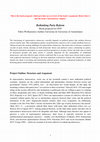
The functioning of representative democracy crucially depends on political parties that mediate b... more The functioning of representative democracy crucially depends on political parties that mediate between citizens and the state. That contemporary parties can perform this connective role is widely doubted, however. Taking seriously the ensuing challenges for representative democracy, this book seeks to advance a normative account of party reform, drawing on both democratic theory and political science scholarship on parties. Moving beyond purely descriptive or causal-analytical perspectives on party reform, the book aims to clarify on theoretical grounds why party reform is centrally important for the sustainability of established democracies, and what effective party reforms could look like in an age where most citizens look to parties with scepticism and distrust. In doing so, the book underlines in distinctive fashion why scholars and citizens should care about re-inventing and transforming political parties, resisting widespread tendencies of either declaring parties unreformable or theorising them out of the picture.
Recent papers by Fabio Wolkenstein

There is widespread agreement that we are living in an age of "democratic backsliding," in which ... more There is widespread agreement that we are living in an age of "democratic backsliding," in which a growing number of formally democratic countries are falling behind previously achieved levels of democratization. But on what grounds can we claim that one level of democratic development is "higher" or "lower" than another? This question has rarely been systematically addressed in recent scholarship, despite the popularity of the language of "backsliding." Reacting to this, this article aims to retrieve a philosophically sophisticated account of democratic progress and regression from the work of Jürgen Habermas, a major figure of Frankfurt School Critical Theory. The article derives from Habermas's thought a distinctive conception of democratic progress, as well as three different meanings of "democratic regression." It also discusses some implications for social science research on democratization.
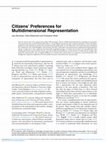
How do citizens want to be represented in politics? We investigate citizens’ multidimensional pre... more How do citizens want to be represented in politics? We investigate citizens’ multidimensional preferences regarding six conceptions of representation that figure prominently in political theory but of which some have been overlooked in empirical work. Using original item batteries and a conjoint experiment, we elicit the relative importance of the dimensions and the types of representation people prefer on each. Our results from surveys fielded in the USA, the UK, and Germany show that (1) descriptive representation has limited appeal for citizens at large, but is important for historically marginalized groups; (2) citizens do not focus on local politicians when thinking about who represents them, but also seek representation from co-partisan politicians in other districts; (3) while citizens strongly value substantive representation, they are largely indifferent as to whether their representatives are responsive to electoral sanctions. Our findings have important implications for how political scientists study democratic representation.

Anglophone historiography on Christian democracy has generally shown little interest in the 1970s... more Anglophone historiography on Christian democracy has generally shown little interest in the 1970s. Yet, the 1970s are a particularly interesting period if one wants to better understand the broader transformations that Christian democracy has undergone between the post-war era and today. This is because two new tendencies made themselves visible in the 1970s, both of which prefigured later developments. The first tendency was a greater progressivism at the level of political ideology, which was inspired by the more left-leaning Zeitgeist of the late 1960s and early 1970s. The second tendency was an increased openness to transnational alliances with non-Christian democratic conservative parties. This culminated in the foundation of the European Democrat Union (EDU) in 1978, which was intended as a centre-right counterweight to the Socialist International (SI). Thus, in the 1970s Christian democratic parties became at once more progressive and more willing to accommodate conservatism – and both manoeuvres were in large part reactions to the perceived predominance of left-wing ideas and parties during that time.
In this chapter, I want to examine these two countervailing dynamics, using the West German CDU/CSU and Austrian ÖVP as my primary cases. These parties are crucial cases not only because they are paradigmatic examples of long-standing European Christian democratic parties, but also because they played a central role in the trans-nationalisation of Christian democracy. Beginning with a brief overview of the wider political context of the late 1960s and early 1970s, the chapter surveys major programmatic changes implemented by the West German and Austrian Christian democrats in the aftermath of 1968.
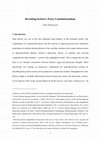
was one of the most important legal thinkers of the twentieth century. His contributions to const... more was one of the most important legal thinkers of the twentieth century. His contributions to constitutional theory and the doctrine of legal positivism have influenced generations of scholars and practitioners of law, and they continue to be a major reference point in legal-theoretical debates. Kelsen's democratic theory, in contrast, has received comparatively little attentionat least in the anglophone world. 1 This is despite the fact that there is an "intimate connection" between Kelsen's legal and democratic thought. 2 More specifically, his writings on democracy complement his legal-theoretical writings by describing how positive norms can be produced in a democratic fashion. Throughout his work, Kelsen sought to carefully differentiate between democratic ideals and democratic realities. As he noted in 1929, in the second edition of On the Essence and Value of Democracy, "In I thank Lars Vinx and Till van Rahden for their very helpful comments on an earlier draft. 1 On the German-language debate, see the recent M. Feldmann, 'Die Parteien(staats)theorie von Hans Kelsen',
Hans Kelsen was one of the most important legal thinkers of the twentieth century, and he is know... more Hans Kelsen was one of the most important legal thinkers of the twentieth century, and he is known for mounting an elaborate defence of liberal party democracy at a time when the latter was hardly the most popular form of regime. This article examines how Kelsen responded to two major political movements he experienced in his intellectual prime: political Catholicism, which he was confronted with in interwar Austria, and Christian Democracy, which became a hegemonic political force in Western Europe after World War II, when Kelsen was already in exile. The article reconstructs Kelsen's complex critique of these two religious movements and reflects on what we can learn from his arguments about current attempts to revive Christian political thought.

This short piece discusses Hélène Landemore's proposal of an 'open democracy', as outlined in her... more This short piece discusses Hélène Landemore's proposal of an 'open democracy', as outlined in her recent book Open Democracy: Reinventing Popular Rule for the Twenty-First Century. Acknowledging the value of Landemore's radical and ambitious proposals, I draw attention to a number of shortcomings and blind spots that have to do with how the case for an 'open democracy' is made: through an unduly brief and dismissive treatment of political parties; a methodological insensitivity to empirical variations of democratic performance and citizens' evaluations of the latter; a failure to distinguish between higher and ordinary law-making in the discussion of the central Icelandic case; and, finally, a surprising concession that realising an open democracy is all but infeasible in established constitutional democracies. If open democracy is to be an attractive ideal, these issues must arguably be addressed.

A number of high-profile cases of elected political leaders subverting democracy have made democr... more A number of high-profile cases of elected political leaders subverting democracy have made democratic backsliding a major issue of concern. But although there exists a broad empirical and legal literature on the topic, there is little sustained theoretical reflection on the meaning of the concept of democratic backsliding. Reacting to this, this article develops a more general theoretical account of democratic backsliding that can be applied across a range of different institutional contexts, and is sensitive to the theoretical complexities inherent in the notion of backsliding. Chief amongst the latter is the fact that speaking of backsliding means assuming a regressive development, which in turn requires committing to potentially problematic assumptions about the directionality of democratic development and history more generally. Drawing on democratic and critical theory, the article advances a proposal for how to handle these issues, and then develops a distinction between two generic forms of democratic backsliding: rights-suspending and rights-obstructing backsliding.
Dieser Beitrag entwickelt die Grundlagen einer demokratischen Theorie demokratischer Regressionen... more Dieser Beitrag entwickelt die Grundlagen einer demokratischen Theorie demokratischer Regressionen, die auf ein nicht-teleologisches, prozessorientiertes Verständnis demokratischer Transformationsdynamiken zurückgreift. Zudem wird den Bürgerinnen und Bürgern demokratischer Verfassungsstaaten eine zentrale Rolle bei der Identifikation demokratischer Rückschritte zugebilligt. Nicht zuletzt darin manifestiert sich der demokratische Charakter der Theorie.
The purpose of this article is to develop the foundations of a democratic theory of democratic regressions that relies on a non-teleological, process-oriented understanding of democratic transformations. As a decidedly democratic theory of democratic regressions, it grants the citizens of democratic constitutional orders an important role in the identification of democratic regressions.

In recent times, it has become increasingly common that elected parties and leaders systematicall... more In recent times, it has become increasingly common that elected parties and leaders systematically undermine democracy and the rule of law. This phenomenon is often framed with the term democratic backsliding or democratic regression. This article deals with the relatively little-studied topic of resistance to democratic regressions. Chief amongst the things it discusses is the rather central ethical issue of whether resisters may themselves, in their attempts to prevent a further erosion of democracy, transgress democratic norms. But the argument advanced in the article is not merely about the ethics of resistance. It begins, perhaps unconventionally, by addressing the affective dimension of resistance to democratic regressions, looking in particular at the powerful feelings of anger and despair that pro-democratic citizens living under a regressive government are likely to experience. As the article argues, these feelings have not only motivational but also epistemic potential, which must be adequately theorized in order to understand how resisters can respond to the ethical challenges facing them.

The notion of 'Christian Europe' has returned with a vengeance in recent times. It figures promin... more The notion of 'Christian Europe' has returned with a vengeance in recent times. It figures prominently in the political rhetoric of conservative nationalists, who link appeals to Europe's Christian heritage and identity to avowedly illiberal political projects. This paper examines this revived idea of Christian Europe by contrasting it with the meanings that prominent Christian Democratic leaders ascribed to the term in the postwar era. This contrast is insightful because it reveals what is distinctive about present understandings of Christian Europe, and it is politically relevant because some of the most committed contemporary proponents of Christian Europe claim to be 'true' Christian Democrats. Using Ernst-Wolfgang Böckenförde's work on the emergence of the modern state as a broad analytical frame, I show that today's visions of Christian Europe are more modern, statist and secular than their postwar counterparts.
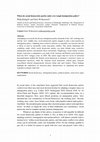
Attempting to reconcile the diverse immigration policy demands of the 'old' working class and the... more Attempting to reconcile the diverse immigration policy demands of the 'old' working class and the 'new' middle class, social democratic parties struggle to take a clear position on immigration policy. Adopting more restrictive policies is a possible way forward, but this is likely to lead to electorally costly intra-party conflict. This article illuminates the conditions under which social democratic parties can unite behind more restrictive immigration policies and promote them consistently. Employing a most-similar systems design, it presents a comparative case study of the Austrian and Danish social democrats, from the 2015 'refugee crisis' to 2020. The article argues that low levels of territorial decentralisation enabled the Danish social democrats to promote a restrictive stance on immigration top-down, while the Austrian social democrats' federal party structure exacerbated internal disagreements between urban and rural leaders. These findings highlight the importance of structural party characteristics in explaining how parties respond to strategic trade-offs.
This article discusses a new phenomenon that has arisen in connection with democratic backsliding... more This article discusses a new phenomenon that has arisen in connection with democratic backsliding in some EU member states: The contribution of European political parties to democratic backsliding. It focuses on the European People's Party's efforts to protect the Hungarian government, and the European Conservatives and Reformists party's permissive acceptance of the Polish government's attacks on democracy and the rule of law, analysing these forms of behaviour as a form of complicity in democratic backsliding. In a second step, the article examines the existing possibilities and normative justification for sanctioning European political parties that make a complicit contribution to democratic backsliding.
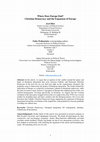
In this article, we argue that an analysis of the conflict around the nature and limits of Europe... more In this article, we argue that an analysis of the conflict around the nature and limits of European integration that arose between Catholic and Protestant Christian Democrats in the postwar era can shed new light on the expansionary dynamics that gradually came to characterise the project of European integration. The former framed the unification of Europe as a relatively exclusionary cultural-civilizational endeavour, while the latter favoured a more inclusive conception of Europe that emphasised free trade over cultural homogeneity. Focusing specifically on Germany, we suggest that the eventual resolution of the intra-party struggle between the two camps in the early 1970s was a crucial enabler for including more and more countries into the European project. For it was only thereafter that Catholic Christian Democrats began supporting the expansion of European integration beyond the core Europe of the original Six, with geopolitical concerns gradually crowding out cultural ones.










Uploads
Books by Fabio Wolkenstein
Nach Ende des Zweiten Weltkriegs feierte die Christdemokratie in Europa ihren Siegeszug. Dabei setzten sich besonnene Staatsmänner wie Konrad Adenauer, Alcide de Gasperi oder Robert Schuman auf einem vormals von Krieg und Gewalt geprägten Kontinent nachdrücklich für Frieden, Wiederaufbau und Stabilität ein. Dennoch hatte die Christdemokratie im Nachkriegseuropa auch eine dunkle Seite: Der autoritäre Geist des reaktionären politischen Katholizismus wirkte in ihr weiter, was sich etwa an der unverhohlenen Bewunderung vieler Christdemokraten für Diktatoren wie Franco und Salazar oder einem angespannten Verhältnis zur freien Presse und den Institutionen der liberalen Demokratie offenbarte. Durch die schrittweise Abkehr von konservativen Positionen – in Deutschland vor allem in der Ära Kohl vollzogen – erfuhr die Christdemokratie schließlich einen nachhaltigen Demokratisierungsschub. Allerdings war der Preis dafür eine ideologische Entkernung. Fabio Wolkenstein blickt in seinem Buch auf die lange und wechselvolle Geschichte der Christdemokratie in Europa zurück und fragt, welchen autoritären Versuchungen sie widerstanden, aber auch welchen sie nachgegeben hat. Dabei spannt er einen weiten Bogen bis zur Gegenwart: Welche Strategien des Machterhalts wählen christdemokratische Parteien heute?
Recent papers by Fabio Wolkenstein
In this chapter, I want to examine these two countervailing dynamics, using the West German CDU/CSU and Austrian ÖVP as my primary cases. These parties are crucial cases not only because they are paradigmatic examples of long-standing European Christian democratic parties, but also because they played a central role in the trans-nationalisation of Christian democracy. Beginning with a brief overview of the wider political context of the late 1960s and early 1970s, the chapter surveys major programmatic changes implemented by the West German and Austrian Christian democrats in the aftermath of 1968.
The purpose of this article is to develop the foundations of a democratic theory of democratic regressions that relies on a non-teleological, process-oriented understanding of democratic transformations. As a decidedly democratic theory of democratic regressions, it grants the citizens of democratic constitutional orders an important role in the identification of democratic regressions.
Nach Ende des Zweiten Weltkriegs feierte die Christdemokratie in Europa ihren Siegeszug. Dabei setzten sich besonnene Staatsmänner wie Konrad Adenauer, Alcide de Gasperi oder Robert Schuman auf einem vormals von Krieg und Gewalt geprägten Kontinent nachdrücklich für Frieden, Wiederaufbau und Stabilität ein. Dennoch hatte die Christdemokratie im Nachkriegseuropa auch eine dunkle Seite: Der autoritäre Geist des reaktionären politischen Katholizismus wirkte in ihr weiter, was sich etwa an der unverhohlenen Bewunderung vieler Christdemokraten für Diktatoren wie Franco und Salazar oder einem angespannten Verhältnis zur freien Presse und den Institutionen der liberalen Demokratie offenbarte. Durch die schrittweise Abkehr von konservativen Positionen – in Deutschland vor allem in der Ära Kohl vollzogen – erfuhr die Christdemokratie schließlich einen nachhaltigen Demokratisierungsschub. Allerdings war der Preis dafür eine ideologische Entkernung. Fabio Wolkenstein blickt in seinem Buch auf die lange und wechselvolle Geschichte der Christdemokratie in Europa zurück und fragt, welchen autoritären Versuchungen sie widerstanden, aber auch welchen sie nachgegeben hat. Dabei spannt er einen weiten Bogen bis zur Gegenwart: Welche Strategien des Machterhalts wählen christdemokratische Parteien heute?
In this chapter, I want to examine these two countervailing dynamics, using the West German CDU/CSU and Austrian ÖVP as my primary cases. These parties are crucial cases not only because they are paradigmatic examples of long-standing European Christian democratic parties, but also because they played a central role in the trans-nationalisation of Christian democracy. Beginning with a brief overview of the wider political context of the late 1960s and early 1970s, the chapter surveys major programmatic changes implemented by the West German and Austrian Christian democrats in the aftermath of 1968.
The purpose of this article is to develop the foundations of a democratic theory of democratic regressions that relies on a non-teleological, process-oriented understanding of democratic transformations. As a decidedly democratic theory of democratic regressions, it grants the citizens of democratic constitutional orders an important role in the identification of democratic regressions.
Am 18. Dezember 2023 werden wir im Wiener Bruno Kreisky Forum für Internationalen Dialog zusammentreffen, um gemeinsam mit Christoph Menke (Frankfurt) über sein neues Buch zu sprechen. Dabei werden wir uns in Vorträgen von Tatjana Sheplyakova (Gießen), Matthias Flatscher/Sergej Seitz (Wien), Peter Anna Zeillinger (Wien) und Linda Lilith Obermayr (Wien) kritisch mit den Bedingungen und Implikationen von Menkes Befreiungsbegriff auseinandersetzen und Bezüge zu aktuellen gesellschaftspolitischen Themen herstellen. An der Organisation des Workshops sind außerdem Alexander Somek, Matthias Flatscher, Oliver Marchart, Fabio Wolkenstein beteiligt.